The BBC News website has to date published seven written reports relating to the July 3rd/4th counter-terrorism operation in Jenin. Seeing as those reports will remain online as what the BBC describes as “permanent public record” that is “in the public interest”, the way in which the background to and reasons for that operation are portrayed in those reports is clearly worthy of review.
The context to that operation includes a rise in violence that began some two years ago with collaboration between known terrorist organisations and the formation of the Jenin Battalion (BBC portrayal of which was previously discussed here), Additional factors include the failure of the Palestinian Authority to exert control over areas, including Jenin, supposedly under its administration and the rise in the number of PA security forces personnel taking part in terrorism and violence. A particularly significant element of the picture is the financing of terror and smuggling of weapons to terrorist organisations located in supposedly PA controlled parts of Judea & Samaria by Iran and its proxies in the region, Hamas and Hizballah.
In February of this year the BBC News website published a backgrounder which purported to explain the rise in violence but in fact failed to do so. So did readers of the BBC’s recent coverage of the events in Jenin get more helpful explanations? Below is a list of the articles published together with the relevant paragraphs portraying the reasons for the operation and its wider context: [emphasis in bold added]
Jenin: Israeli military launches major operation in West Bank city, Yolande Knell & David Gritten, 3/7/23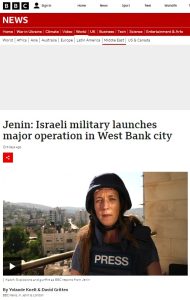
Reasons:
“Israel said it was putting a stop to Jenin being “a refuge for terrorism”. Palestinians accused it of a war crime.”
“Drones were used for further air strikes and a brigade-size force of troops was deployed in what a military spokesman described as a “counter-terrorism operation” focused on seizing weapons and breaking “the safe haven mindset of the camp, which has become a hornet’s nest”.
In the past year and a half, Palestinians behind some 50 attacks targeting Israelis have come from Jenin, according to the military.”
“The city has seen repeated Israeli military raids in the past year as local Palestinians have carried out deadly attacks on Israelis. Other Palestinian attackers have hidden there.”
Context:
“Jenin has become a stronghold of a new generation of Palestinian militants who have become deeply frustrated by the Palestinian Authority’s aging leadership and the restrictions of the Israeli occupation.”
Israel’s Jenin operation reignites Palestinian anger, Jeremy Bowen, 4/7/23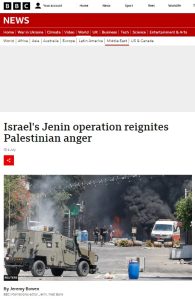
Reasons:
“The Israelis said they moved in on the Jenin camp because more than 50 relatively recent attacks were launched from there.”
“It was a matter of time before the Israeli army moved against the Palestinians who controlled Jenin refugee camp. It says it is carrying out a systematic operation to track down and destroy weapons and explosives.”
Context:
“But the roots of violence, despair and hatred go much deeper than the latest violent confrontations. They thrive in the poison generated by a conflict over possession of the land that started more than a century ago.”
“The Israeli operation here in Jenin was in the air for months. Despite regular smaller Israeli raids, Palestinian armed groups had become strong enough and united enough to control the Jenin refugee camp. They seemed to be getting stronger.”
“When this operation ends, on past form both sides will claim victory. Then the current realities of this long conflict will reassert themselves. Anger, despair and poverty will reinforce the culture of resistance that has embedded itself in Palestinian society, especially here in Jenin and in Nablus. And Israel’s right-wing, hyper-nationalist government, as long as it lasts, will try to match its rhetoric with action.”
Gaza-Israel exchange of fire as Israeli forces complete Jenin withdrawal, David Gritten, 5/7/23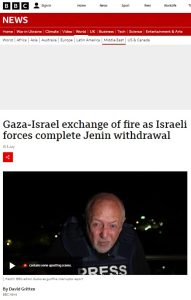
Reasons:
“The military said the “counter-terrorism operation” was focused on seizing weapons and “breaking the safe haven mindset of the camp”.”
“The city has seen repeated Israeli military raids in the past year as local Palestinians have carried out deadly attacks on Israelis. Other Palestinian attackers have hidden there.”
Context:
“Jenin has become a stronghold of a new generation of Palestinian militants who have become deeply frustrated by the West Bank-based Palestinian Authority’s aging leadership and the restrictions of the Israeli occupation.”
Palestinian families return to rubble in Jenin refugee camp, Eman Eriqat & Alaa Daraghmeh, 5/7/23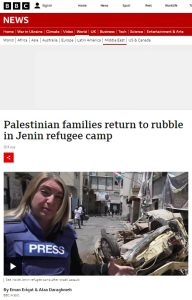
Reasons:
“The IDF described it as a “counter-terrorism operation”, saying they were targeting weapons stores and manufacturing facilities belonging to militant groups in the area.
But the Palestinian foreign ministry condemned the operation as “open war against the people of Jenin”.”
Context: none provided
Jenin: Palestinians fear escalation after destructive West Bank assault, Tom Bateman, 5/7/23
Reasons: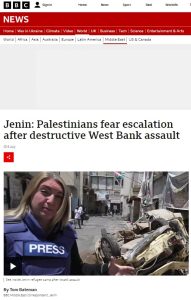
“Israel says it will continue to root out what it calls “a city of refuge for terrorism” in Jenin, but the Palestinian militant factions say they will intensify their activities.”
Context:
“I have been coming to Jenin repeatedly over the last year and a half, as a new generation of armed militants has formed, rejecting the ageing Palestinian leadership and shooting at the Israeli army during its growing raids into the city.
This is a generation that believes the official Palestinian Authority (PA) sold out on their future and became little more than a security company for Israel’s military occupation, which secures the expanding Israeli settlements in the West Bank, built on the land Palestinians want for a future state and illegal under international law.”
“The growing violence is a further sign of the collapse of any political horizons. Some fear that Palestinian cities in the West Bank will see more intensive military attacks and security crackdowns – more akin to the plight of people in Gaza, which is governed by Hamas and blockaded by Israel.
More Palestinians reject their own internationally recognised leadership and back armed resistance, while Israel remains in the grip of the most extreme government it has ever known, which has vowed to extend what it calls exclusive Jewish rights to all the land.”
Jenin: Palestinian boy killed during Israeli assault was unarmed – family, Tom Bateman, 11/7/23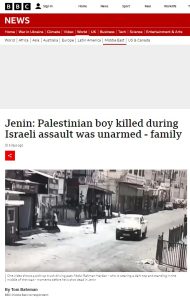
Reasons:
“…the military incursion, which Israel said was intended to root out a “safe haven of terrorism” in Jenin refugee camp.
It follows over a year of rising numbers of Palestinian armed attacks targeting Israelis, while Israel has intensified its deadly military raids in the West Bank. At least 160 Palestinians and more than 30 Israelis have been killed since January.
Israel’s government said its military operation last week was to stop the camp being a “refuge” for armed groups. It said it seized “hundreds” of guns and other weapons, including “advanced” improvised explosives.”
Context:
“The refugee camp is a highly militarised environment where the official Palestinian leadership has lost control, and armed groups see themselves as a core of resistance to Israel’s military occupation – now into its 57th year.”
Jenin: Abbas bids to reassert control with rare visit after Israeli assault, Tom Bateman, 12/7/23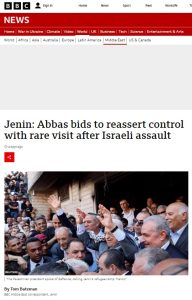
Reasons:
“The past year has seen rising numbers of Palestinian armed attacks targeting Israelis, while Israel has intensified its deadly military raids in the West Bank. At least 160 Palestinians and more than 30 Israelis have been killed since January.”
“Israel’s government said its two-day military operation last week was to stop Jenin camp being a “refuge for terrorism”. It said it seized hundreds of guns and other weapons, including “advanced” improvised explosives.”
Context:
“The PA was created during the Oslo peace accords of the 1990s, giving Palestinians limited self-governance ahead of a hoped-for transition to an independent state.
Now, many Palestinians view it as a security sub-contractor for Israel’s military occupation of the West Bank, which is into its 57th year. Polls suggest most Palestinians now back armed resistance, believing the PA fails to protect them.”
“The camp is largely in the control of militants calling themselves the Jenin Brigade. It is a loose alliance of armed organisations including the more established groups Hamas and Islamic Jihad. They are all listed by Israel and the West as terrorist organisations.”
As we see, the BBC’s various reporters largely refrained from portraying the reasons for the operation in their own words and instead relied mostly on generously punctuated quotes from IDF officials in which even the term counter-terrorism operation was placed in inverted commas – and hence qualified.
With regard to the broader context, BBC audiences were once again told of ‘frustration’, ‘anger, despair and poverty’ and rejection of the PA leadership by the younger generation. Notably, both Jeremy Bowen and Tom Bateman shoehorned the Israeli government that has only been in power since late December 2022 into their portrayals of violence that began to rise two years ago. Bateman’s portrayal of the violence as a “sign of collapse of political horizons” airbrushes the fact that neither of the two main terror groups currently active in Jenin and elsewhere in Judea & Samaria has any interest whatsoever in a political solution and both aspire to eradicate Israel.
Also notable is the use by the same two BBC journalists of the terms resistance and armed resistance – interestingly, without any qualifying punctuation. While Bowen and Bateman are certainly not the only writers to have portrayed lethal terrorism in that romanticised and euphemistic fashion in recent weeks, the fact that the BBC published four items using that term in just over a week is remarkable, especially in light of its claim to eschew terminology with “significant political overtones” and its purported avoidance of “other people’s language”.
As we see, just one of those seven BBC reports tells audiences that the Palestinian Authority “lost control” over Jenin and other areas but without providing any additional information. None of those seven articles provides an explanation of the outside factors that have contributed to the rise in terrorism emanating from Jenin and elsewhere such as external financing and weapons supply. The level of BBC commitment to providing its audiences with the full range of background information needed to understand this heavily reported story is demonstrated by the fact that the word Iran does not appear in any of these seven reports.
Related Articles:
AN UNHELPFUL BBC BACKGROUNDER ON ‘ISRAELI-PALESTINIAN VIOLENCE’
BBC AGAIN VISITS TERRORISTS IN JENIN, PROMOTES ONE-STATERS – PART TWO

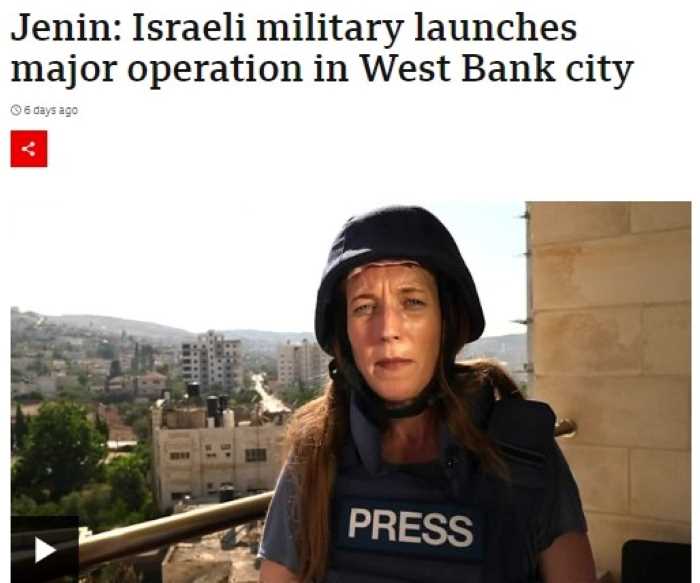



The BBC, reporting falsehoods, distortions and biased opinions and embedding them into historical records for future generations to be deceived into believing as the truth. #defundthebbc